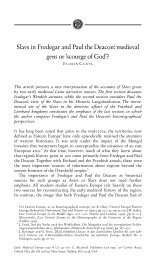A READER IN COMPARATIVE INDO-EUROPEAN MYTHOLOGY
A READER IN COMPARATIVE INDO-EUROPEAN MYTHOLOGY
A READER IN COMPARATIVE INDO-EUROPEAN MYTHOLOGY
Create successful ePaper yourself
Turn your PDF publications into a flip-book with our unique Google optimized e-Paper software.
„strength“ the etymology is ultimately unknown; the name is probably borrowed from<br />
Anatolian, cf. the theonym Apalliunaš attested in Hittite documents dealing with<br />
Wiluša/Troy. In Homer's epics, he is the protector of the Trojans, and his cult was<br />
certainly very widely known in Asia Minor. Athḗnē was attested in Linear B tablets (Myc.<br />
A-ta-na), but it seems to have been the general noun, perhaps meaning „lady“. It is of pre-<br />
Greek origin. Likewise of probably Anatolian origin is Ártemis, the hunter-goddess, (Myc.<br />
A-ti-mi-te, dat.) –cf. Lyd. Artimuś, Etruscan Aritimi. Attempts to derive her name from Gr.<br />
árktos 'bear' are futile. Hḗphaistos, the blacksmith god, has a name of unknown origin.<br />
Although he was certainly worshipped by the professional smiths, few of the myths about<br />
him have been preserved, and he is chiefly know as the husband of the unfaithful<br />
Aphrodítē, the goddess of love. Her name is also obscure, though her bimbo-like<br />
appearance and many attributes (e.g. khryséē 'golden', or thygátēr Diós 'daughter of Zeus')<br />
make her comparable to the Vedic Dawn Goddess, Ušās. Aphrodite's name bears no<br />
relation whatsoever with aphrós „foam“, despite the folk-etymology; the true origin of the<br />
name is unknown. Her cult seems to have spread from Paphos on Cyprus, where she had<br />
her oldest sanctuary. On the other hand, the Greek Dawn Goddess, Ēṓ s, whose name is<br />
identical to Ušās, is somewhat eclipsed already in Homer. She is mentioned rarely,<br />
though, and her name is often modified by the beautiful poetic epithet rhododáktylos<br />
'rose-fingered'. Árēs, the god of war, is a personified abstraction – his name is obviously<br />
derived from ará „curse“. Likewise, Hermâs (Myc. E-ma-ha) seems to have been,<br />
originally, „the binder“; his name is derived from *ser- „fasten together“ (Gr. eírō, Lat.<br />
sero „link together“, sermo „speech“, Skr. sísarti „stretches, extends“, which is often<br />
predicated of Mitra's hands. He can be compared to Varuna, who binds the sinners in the<br />
RV (Hermes is the psychopomp in the Greek religion), and also to Pūšan, who is<br />
connected to cattle and cattle-raiding (it was Hermes who stole Apollo's cattle). Poseidáōn<br />
(Myc. Po-si-da-wo-ne, dat.), the lord of the sea, who has also a strong connection with<br />
horses, was originally called *potey-dāwōn „the lord (*potis) of *dā, whatever that is (cf.<br />
páti- dā́ nunas „the lord of waters“, RV 1.136.3, of Varuṇa). Pân, the protector of roads<br />
and shepherds, is clearly related to Ved. Pūšan-(< *pewh2son-, see above), and the name<br />
of the god of wine, Diónysos (Myc. Di-wo-nu-so) is derivable from *diwos nuso- „the<br />
nuso- of the Sky, whatever nuso- originally meant.<br />
Persephónē is the abducted wife of the god of the underworld. Her name is probably from<br />
peírein „pierce“ and phaós „light“, but she is often called simply Kórē 'girl'. The name of<br />
her spouse, Haídēs, according to some linguists, may be from *sm-wid- (?) „the place<br />
where one sees his ancestors again“, but it is more probably from *Haywid- < *sh2ey-w-,<br />
cf. Lat. saevus „cruel“, from the root *sh2ey-„to bind“, cf. Ved. sétu-, the fetter of Varuṇa.<br />
The name of the Muse, Moûsa, is from PIE *montyā „memory“, from the root *men-<br />
„think“ (Lat. mens, OCS mьniti, Skr. mányate, etc.). There was originally only one Muse,<br />
and their classical number of seven has been fixed only during the classical period.<br />
Finally, the name of the domestic goddess Hestía is the word for „fireplace“, Gr. hestía <<br />
*westi-, cf. Lat. Vesta. The goddess of childbirth, Eileíthya (earlier Eleúthya, Myc. e-re-uti-ja);<br />
her name is usually related to Gr. ḗ lython, êlthon 'I came' (< PIE *h1lewd h -, OIr.<br />
luid 'came'), because she comes to the help of women at childbirth, but this may be just



